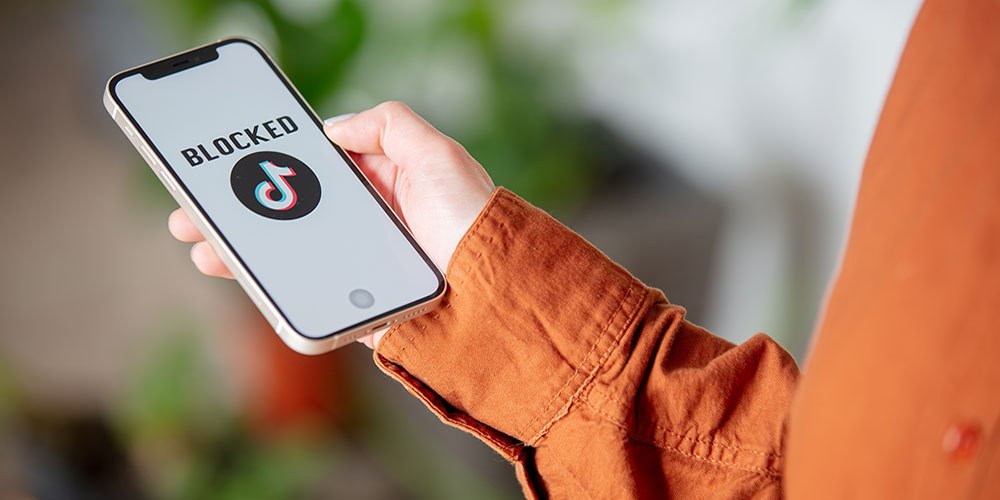Some colleges are banning TikTok from campus devices or urging students to delete the app from their personal devices after President Joe Biden approved a limited ban prohibiting the use of the app on devices issued by the federal government.
Two weeks ago, Biden signed a 4,126-page spending bill that in part prohibits the use of the app, which is owned by the Chinese company ByteDance, on devices issued to its nearly four million employees, reports NBC News. The law gives the White House Office of Management and Budget (OMB) 60 days “to develop standards and guidelines for executive agencies requiring the removal” of TikTok from federal devices.
Staffers were sent a memo indicating they must delete the app and may no longer download it on their government-issued devices. Exceptions were made for law enforcement, national security, and security research purposes.
Led largely by Republicans, there have been pushes to ban the app for over two years. In Dec. 2020, a proposed ban by then-President Donald Trump was stopped in court. Calls to ban the app from government devices gained momentum in November after U.S. FBI Director Christopher Wray said it poses national security risks.
Concerns continue to pour in from other sources, including media companies. Several weeks ago, TikTok officials confirmed to Forbes that its employees improperly tracked the locations of three of the publication’s journalists, using methods that Forbes considered spying. As a result, one ByteDance executive resigned and another was fired.
TikTok and the Biden administration have been locked in negotiations over a proposed security agreement. According to Reuters, the app has continued to assure Washington that the personal data of U.S. citizens cannot be accessed and its content cannot be manipulated by China’s Community Party or any other entity under Beijing’s influence.
More than 20 states have since followed suit. On Monday, New Jersey Governor Phil Murphy and Ohio Governor Mike DeWine ordered the app be banned from government-owned and managed devices. Murphy’s office said the decision was made because “there have been national security concerns about user data the Chinese government might require ByteDance to provide.” Similarly, DeWine said in his order that TikTok’s “surreptitious data privacy and cybersecurity practices pose national and local security and cybersecurity threats to users of these applications and platforms and the devices storing the applications and platforms.”
Murphy also said he was banning software vendors, products, and services from other Chinese companies, including Huawei Technologies, Hikvision, and Tencent Holdings, as well as Russian-based Kaspersky Lab. On Dec. 1, the Federal Communications Commission (FCC) adopted new rules prohibiting communications equipment deemed to pose an unacceptable risk to national security from being authorized for importation or sale in the U.S. Hikvision, Dahua, and Hytera are among the China-based companies cited in the ban.
On Jan. 12, governors of Wisconsin and North Carolina signed orders banning TikTok on state government-issued devices. North Carolina Governor Roy Cooper signed an order directing officials to develop a policy within 14 days that prohibits the use of both TikTok and WeChat, another Chinese-owned social media app. Like Murphy, Wisconsin Governor Tony Evers also banned products and services from several China-based companies.
TikTok said it was “disappointed that so many states are jumping on the political bandwagon to enact policies that will do nothing to advance cybersecurity in their states and are based on unfounded falsehoods about TikTok.”
Colleges Ban TikTok, Warn Students of Security Concerns
At a more local level, colleges and universities are pushing students and staff to remove the app from their devices while some are banning the app from campus networks and devices. On Dec. 20, the University of Oklahoma sent an email saying it banned TiukTok on all university-owned and operated devices, including wired and wireless internet. According to Oklahoma News 9, Oklahoma State University, the University of Central Oklahoma, and Northwestern Oklahoma State University have also banned on-campus network access to TikTok.
Other schools that have blocked TikTok from network access include Auburn University, Boise State University, Idaho State University, and Lamar University. The University System of Georgia, which is made up of 26 public institutions, banned TikTok from all of its computers and mobile devices as well.
On Thursday, the University of Florida sent an email to all members of the campus community “strongly discouraging” using the app and recommending they remove it from their personal devices, Tampa Bay News reports.
“The university treats the protection of UF data — academic records, research, financial information, and other sensitive, personally identifying information — as an institutional priority,” the email said. “Thank you for doing your part in helping to protect UF.”
The message also said there is a “strong possibility” the app will soon be added to a list of nonpermitted software applications that can be used on campus devices or networks. A university spokesperson said the guidance was an independent decision made by UF.
TikTok has over one billion users worldwide and has been downloaded over 210 million times in the U.S., according to Wallaroo Media. It generated $4.6 billion in revenue in 2021.













